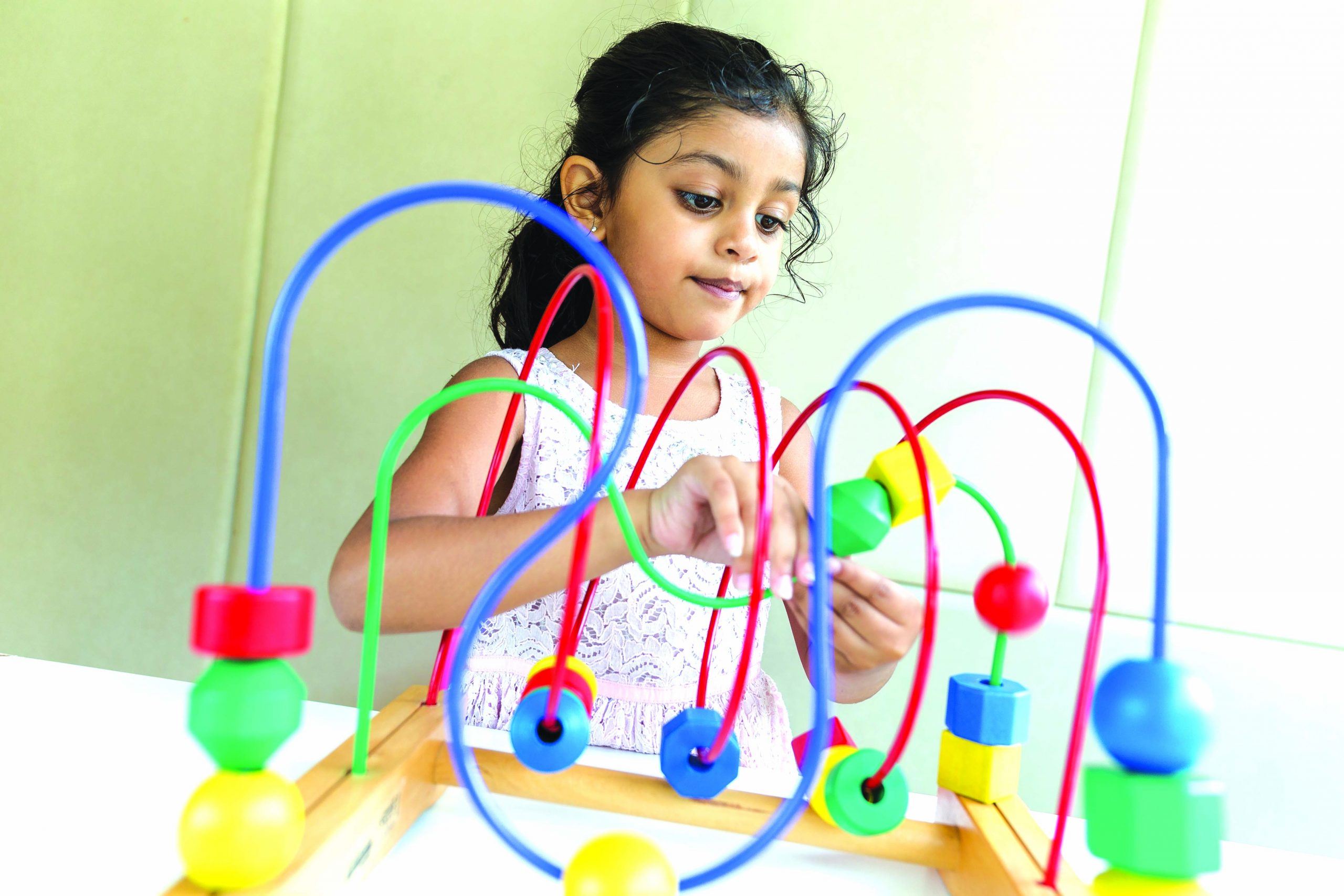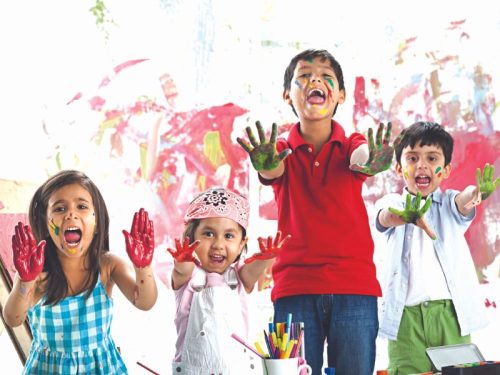Unlocking children’s inherent creativity
There is rising awareness within government, educators and parents about the importance of equipping India’s generation next with creativity and innovation skills to enable them to succeed in the 21st century VUCA world, writes Ramiya Sakthivel, Cynthia John & Mini P.

Even if belatedly, there is rising awareness within government, educators and parents about the importance of equipping India’s generation next — the largest child and youth population worldwide — with creativity and innovation skills to enable them to succeed in the 21st century VUCA (volatility, uncertainty, complexity, and ambiguity) world.
Gerard Puccio, chair, International Center for Studies in Creativity at Buffalo State University (USA), defines creativity as “the ability to see new opportunities, to produce original ideas, to flexibly adapt to changing situations, and apply one’s imagination to solve complex problems”.
The National Education Policy (NEP) 2020, released in July 2020 by the Union education ministry after an interregnum of 34 years, accords high importance to developing children’s creativity and critical thinking skills in the country’s 1.5 million primary-secondary schools. Throughout the 63-page document, the policy exhorts educators from preschool to higher education to fashion “learning environments which promote creativity” to deliver “holistic and multi-disciplinary education”.
With Planet Earth, aka Gaia, confronted with unprecedented global existential dangers — climate change, rampaging pandemics, persistently high inflation, wide income inequality and high unemployment among other challenges — there’s an emerging global consensus that school and higher education systems around the world need to be redesigned and re-engineered to teach creativity and encourage innovative thinking from earliest age.
The Washington-based Partnership for 21st Century Learning (estb.2002), an “advocacy organisation focused on infusing 21st century skills into education”, highlights “creativity and innovation” as vital 21st century skills. More recently, the Davos-based World Economic Forum in its The Future of Jobs Report 2025 unambiguously stresses that “creativity, originality and initiative” are the most important skills that need to be developed. Likewise, the US-based Forbes magazine also includes creativity in its list of ‘Top 10 Most In-Demand Skills for The Next 10 Years’.
“Creativity will be one of the most desirable skills in future workplaces, especially as we hand routine tasks over to machines. Creative thinking, like coming up with new ideas, problem-solving, imagining beyond the status quo, and implementing ideas to fix issues and make things better, will be critical in workplaces of the future,” writes Bernard Marr, author of Future Skills: The 20 Skills and Competencies Everyone Needs to Succeed in a Digital World in Forbes (August 22, 2022).

Dipankar Das, CEO of Dugong Rising, an NGO committed to making the Andaman & Nicobar Islands climate change resilient through innovative solutions, concurs. A child prodigy who began making toys from mud when he was a class I student, Das won the Dr. A.P.J. Abdul Kalam IGNITE Award 2015 for innovating several products including a solar pulse thresher, deep freeze device for fishermen and a lightweight water portable headload for women. “Creativity is the most important skill to succeed in workplaces of the future. Unfortunately in India, the vast majority of schools still encourage learning for exams by rote and memorisation, a prescription to kill creativity. Fortunately NEP 2020 unambiguously rejects rote learning and strongly directs all schools to switch to experiential pedagogies to develop children’s higher order thinking skills. While schools and educators need to integrate creativity into their curriculums, parents should also nurture this skill in children from early age. In my own case, my parents always encouraged me to tinker with objects and learn through play,” recalls Das.
ParentsWorld interviewed several experts including educators, parenting counsellors and paediatricians on ways and means to develop children’s creative thinking skills. Among their recommendations:
At-home activities to promote children’s creativity
Encourage children to ask questions. Develop children’s questioning skills by encouraging ‘why’ and ‘why not’ questions. “The home is an ideal place to start encouraging children to think creatively and critically. During conversations and discussions, parents should prompt children to ask questions, reason, and ideate solutions to problems. Not a few parents erroneously believe that encouraging children to raise questions and queries will make them argumentative. Developing capabilities to question, reason and debate are critical for stimulating children to think innovatively. All children are naturally curious and it is a parenting obligation to encourage them to transform their curiosity into creativity,” says Rajat Soni, a Delhi-based teen and parenting coach and author of Unjudge your Teenager (2020).
Provide creative spaces. Children need conducive spaces at home to practice and display their creativity. Provide bulletin boards, chalk boards, and other spaces where children can display their creative work, post ideas, designs and decorations. It will motivate children to engage in creative activity.
Encourage discovery and exploration through unstructured play. The consensus among child psychologists is that encouraging unstructured play is the best way to nurture children’s curiosity and sense of discovery. By providing your children free play time, you provide them opportunity to improvise games and activities using their imagination.
“Allow children time for independent play so they can explore, discover and learn on their own. In particular in early childhood, children learn through unstructured and unsupervised play. Freed from the burden of helpful adults providing instruction, children learn to experiment and ideate. Independent play teaches children to become self-reliant, creative, imaginative, and improves their focus and critical thinking capabilities,” advises Shivani Sharma, a Delhi-based positive parenting coach who conducts workshops on parenting and right brain education through play and art.
Here are some independent play ideas for pre-primary and primary school children:
• Tactile play. Encourage children to experiment with paint, sand, clay, water. It will stimulate their creativity and imagination.
• Easy-to-solve puzzles. Sharpens children’s problem-solving skills.
• Color sorting. This is a good way to introduce children to classification.
• Sensory bag. Fill a recyclable bag with tactile materials such as hair gel, pumpkin seeds and marbles. As children squish the bag and move its contents, they learn about the materials through their fingers, eyes and ears.
• ‘Strewing.’ This is a popular concept in “unschooling”. Adults strew a few toys around children to “stumble” upon, discover and improvise play and games.
Storytelling. Oral storytelling is an age-old tradition to spark children’s imagination. Parents should make the time and effort to narrate and/or read to children — before bedtime, during car and train journeys and weekends. Moreover, once a week schedule a story-building game in which children create their own stories from parental cues and narrate it.
Provide free, uninterrupted time slots. Don’t cram children’s schedules with too many tuitions and extra-curricular activities. Provide children free time to pursue a creative activity and allow them to experience boredom. Bertrand Russell (1872-1970), the renowned English mathematician, philosopher and public intellectual, famously attributed development of his formidable cognitive capabilities to long periods of rumination during lazy afternoons spent on his parents’ country estate. In periods of boredom and inactivity, peripheral regions of the human brain — known as the default network — become active and connect unrelated thoughts and sort information.
This is validated by research scholars Teresa Belton and Esther Priyadharshini of East Anglia University, UK. In a paper published in the Cambridge Journal of Education (2007), they contend that boredom must “be recognised as a legitimate human emotion that can be central to learning and creativity”.

Encourage creative problem-solving. Involve children in solving everyday problems at home, school and in the local community. Over dinner table conservations and/or during post-prandial discussions, highlight a community or civic problem and invite children to provide solutions. “During this exercise, you need to be patient with children and resist temptation to prompt them. Encourage them to think freely, and present solutions which can be refined later. If a solution is actionable, proceed to draw up a plan to implement it. This will boost their confidence and motivate them to think creatively and develop a problem-solving mindset,” says Shivani Sharma (quoted earlier).
7 creative activity benefits
The benefits of encouraging creative activities including art, dance, music, drama, science exploration etc are manifold. Dr. Akash Paul, a Port Blair-based general physician and founder, Blue Green Foundation, which works in the area of environment preservation, shares seven physical and cognitive benefits of engaging children in creative activities.
1. Develops fine motor skills. Creative activities such as art and crafts in early childhood develop children’s fine motor skills, dexterity and tactility.
2. Physical development. All types of hands-on practical activities including children presenting science display models, clay specimens, tinkering with machines etc, develop hand and eye coordination, body balance, muscle growth and spatial awareness.
3. Sensory development. Devise activities that develop children’s observation skills, listening capabilities and senses of touch, taste, smell, hearing and sight.
4. Inspire imagination. “Imagination is more important than knowledge”, said Albert Einstein. When you nurture children’s imagination, you stimulate their creativity, which in turn boosts cognitive learning, emotional wellbeing and self-development.
5. Improve communication skills. Develops children’s language, self-expression, self-confidence, inter-personal communication and social skills.
6. Improve concentration. Engaging in creative tasks builds children’s persistence, patience and concentration skills.
7. Promote well-being and happiness. Individuals provided the opportunity to express their creativity, and develop problem-solving skills, become resilient and experience fulfilment in their daily lives. And they are physically healthier.
Stimulating children’s creativity

In an essay published in MIT Press Reader (2020), Dr. Mitch Resnick, professor of learning research at MIT Media Lab of the globally Top 10-ranked Massachusetts Institute of Technology (MIT), Boston, suggested ten ways and means to stimulate children’s creativity. The list is organised around five components of a ‘Creative Learning Spiral’, a process that encourages children to imagine what they want to do; ideate projects while playing with tools and materials; share ideas and assignments with others, and reflect on their experiences. Excerpts:
IMAGINE
1. Provide examples to spark ideas
A blank page, canvas, or blank screen can be intimidating. A collection of examples can help to spark imagination. There is the risk that children will mimic or copy the examples provided. That’s alright for a start, but only as a start. Encourage them to change or modify the examples. What might they do differently? How can they add their own style, connect it with their interests? How can they make it their own?
2. Encourage messing around
Most people assume that imagination takes place in the head, but hands are as important. To help children generate ideas for projects, encourage them to start ‘messing’ with materials. As children play with lego bricks, tinker with craft materials, novel ideas emerge. What starts as an aimless activity becomes the beginning of a project.
CREATE
3. Provide wide variety of materials
Children are deeply influenced by toys, tools and materials around them. To stimulate children to engage in creative activities, make sure they have access to a diversity of materials for drawing, building and crafts. New technologies materials like robotics kits and 3-D printers, expand the range of what children create. However don’t overlook traditional materials.
4. Embrace all types of making
Children are interested in different types of making. Some enjoy making houses and castles with lego bricks. Others enjoy crafting jewelry or soapbox race cars, making desserts or designing miniature golf courses. Writing a poem or a short story is a type of making, too. Help children discover the type of activity that resonates with them.
PLAY
5. Highlight process, not product
As children work on projects, highlight the process, not the final product. Ask children about their strategy and sources of inspiration. Encourage experimentation by honoring failed experiments as much as successful ones. Allocate time for children to share the intermediate stages of their projects and discuss what they plan to do next and why.
6. Extend time for projects
It takes time for children to work on creative projects, especially if they’re constantly tinkering, experimenting, and exploring new ideas. Trying to squeeze projects into the constraints of a standard 50-minute school period — or even a few 50-minute periods over the course of a week — undermines the whole idea of working on projects.
SHARE
7. Play role of matchmaker
Many children want to share ideas and collaborate on projects, but they’re not sure how. You can play the role of matchmaker, helping children find others to work with.
8. Get involved as a collaborator
Parents and mentors sometimes become too involved in their children’s creative projects, telling children what to do or grabbing the keyboard to show them how to fix a problem. Some parents and mentors don’t get involved at all. There is a sweet spot in between, where adults and children intelligently collaborate on projects.

REFLECT
9. Ask (authentic) questions
It’s great for children to immerse themselves in projects, but it’s also important for them to step back to reflect on what’s happening. Encourage children to reflect by asking them questions about their projects. I often start by asking: “How did you come up with the idea for this project.” The question prompts them to reflect on their motivation and inspiration.
10. Share your reflections
Most parents and teachers are reluctant to talk to children about their own thinking processes. Perhaps they don’t want to expose that they’re sometimes confused or unsure in their thinking. But talking with children about your own thinking process is the best gift you could give them. Imagine the children in your life as creative thinking apprentices; you’re helping them learn to become creative thinkers by demonstrating and discussing how you do it.
(Source: https://thereader.mitpress.mit.edu/)
















Add comment